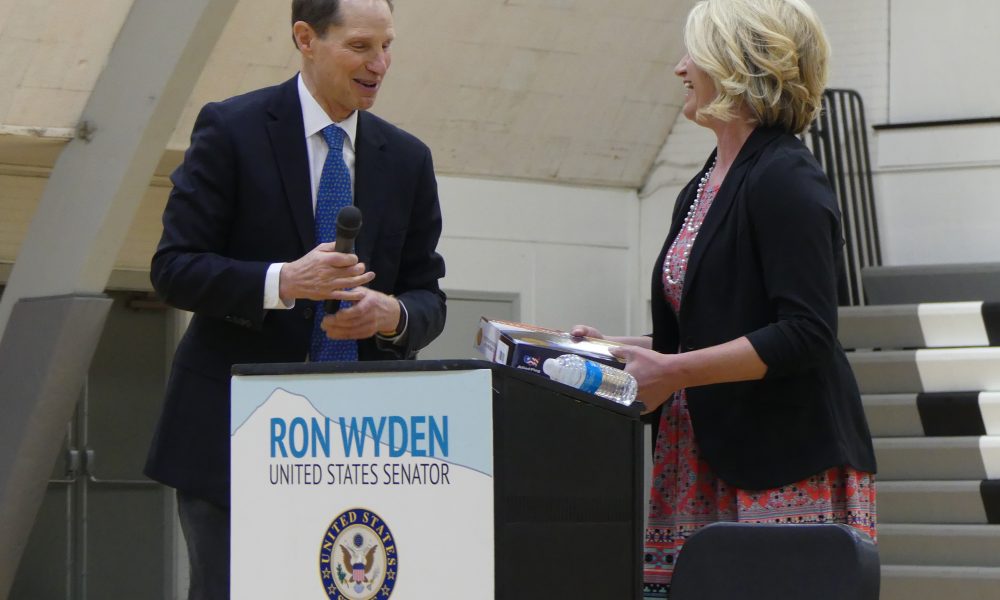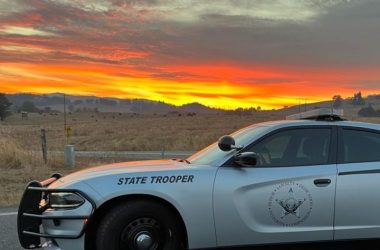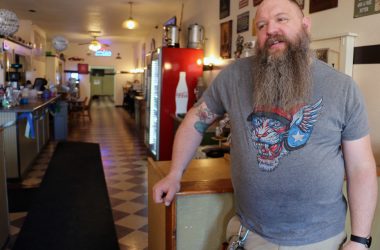
Vale School District Superintendent Alisha McBride accepts a flag previously flown at the U.S. Capitol from Oregon Sen. Ron Wyden Monday at Vale High School. Wyden held his town hall for the first time at Vale High School. (The Enterprise/John L. Braese)
VALE – U.S. Sen. Ron Wyden has conducted more than 880 town hall meetings since his election in 1996.
In all that time, he has never conducted one at Vale High School – until Monday.
Wyden stood before a packed group of students with a handful of local citizens and dignitaries, opening with a brief explanation of a town hall and providing a flag flown over the nation’s Capitol to Alisha McBride, Vale School District superintendent.
“We will fly this flag over the new middle school once completed,” said McBride.
Questions from the students took up most of the town hall and Wyden quickly jumped into the fray.
The Viking students showed the Democratic senator their knowledge of national and international affairs, asking his view on marijuana state rights, school shootings, term limits, special counsels, farm legislation and sanctuary cities.
Referring numerous times to “The Oregon Way,” Wyden addressed how states can have marijuana laws in conflict with federal policy.
“The voters of a state have to be respected,” said Wyden. “The federal government cannot just go out and trample on state’s rights.”
Wyden said he supported changes in the banking regulation and taxes to allow those selling marijuana to place money in a bank instead of “hauling around wheel barrows full of cash.”
Wyden said there were “pieces to the puzzle” to stop school shootings experienced across the nation.
“We need ideas that make sense,” Wyden said. “We have to have a background check that is loophole free. We need to be all in on mental health in this nation. And, we have to do something about bump stocks, those firearms that shoot multiple rounds.”
Students questioned him about government spending.
“Medicare continues eat up the budget,” Wyden said. “I, along with Orrin Hatch of Utah, have drafted a bill that would allow the use of non-physicians as providers, cutting costs. I am also a proponent of telecare, using the technology to better treat people in rural areas. Students need to remember for more money spent on Medicare means less money spent on schools and transportation.”
Responding to a question from Connie Johnson, manager of the Vale Food Pantry, Wyden said he was against proposed changes to food assistance programs. Some proposed changes would halt food help for adults who don’t have children at home.
“I am opposed to any changes in the SNAP program,” said Wyden. “I view the program as preventative. For every dollar spent on SNAP, it is $5 down the road. We need to ensure our seniors are being fed a good meal each day.”
Students asked Wyden his views on state educational testing.
“I am against mindless teaching for the test,” the senator said. “I think we need to have testing that is relevant to monitor the growth of a student.”
Vale City Councilman Matthew Whitaker’s follow up provided the most heated exchange of the meeting.
After Wyden said he supported choices in education between public and private education, Whitaker asked why his tax money should support public education if he chooses to place his child in a private school.
“I am not for using public money in private purposes,” Wyden responded.
Whitaker pressed on why people are being taxed for something they don’t use.
Wyden said that if taxpayers were only required to pay for programs used, the system would fail.
“People would say they don’t use the highway system so don’t have to pay or don’t believe in our military so don’t have to pay that portion,” Wyden explained.
Turning to international events, Wyden said it was a “good thing” President Trump was reaching out to North Korea.
Regarding immigration and sanctuary cities, Wyden agreed the current system is “broken and a dysfunctional mess.”
“We do need to beef up our borders,” Wyden said. “We also need to enforce the laws already on the books. As for the people already here, I believe they need to voluntarily pay a fine, show they are fluent in English and then they would be placed at the end of the line for citizenship.”




